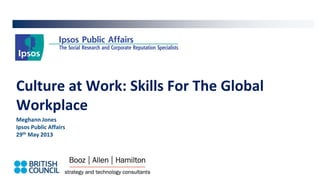Culture At Work Presentation by Meghann Jones, Research Director, Ipsos Public Affairs
- 1. Culture at Work: Skills For The Global Workplace Meghann Jones Ipsos Public Affairs 29th May 2013
- 2. 2 Globalized world, new economies emerging Changing workplace: international and multi-cultural Necessary to work across international borders and in multi-cultural teams Context to the research What are the skills needed to do this?
- 3. 3 What did we do?
- 4. 4 o Large companies and organizations o Decision makers o Responsible for recruitment and skills development strategy Survey of employers in nine countries
- 5. 5 The countries were... United States Brazil United Kingdom South Africa India Jordan United Arab Emirates Indonesia China
- 6. 6 Types of organizations included Sample size ŌĆó n=367 (appx. n=40 per country) Organization Type: ŌĆó 54% Private Sector ŌĆó 23% Public Sector ŌĆó 23% NGO/Charity/3rd Sector Private Sector Types: ŌĆó Mix of Manufacturing, Finance, Construction, Retail Trade, Professional Services, Wholesale, Transportation, Health care, etc. Public/NGO Sector Types: ŌĆó Mix of Health, Education, Home Affairs, International Development, etc.
- 7. 7 Two-thirds interact frequently with those overseas... % organizations where English is spoken day-to-day ... and English is used extensively day-to-day
- 8. 8 What did we find?
- 9. The top business challenge is finding qualified employees % of employers reporting business challenge 9 FINDING QUALIFIED CANDIDATES (29%) GOVERNMENT REGULATION (23%) COMPETING GLOBALLY (20%)
- 10. Top HR challenge is finding and retaining employees % of employers reporting HR challenge 10 Finding candidates with right formal qualifications Retaining good employees Finding candidates with good communication skills Training employees on new processes Finding candidates who understand the market Finding candidates with good foreign language skills
- 11. When we asked employers about ŌĆ£intercultural skillsŌĆØ specificallyŌĆ” 11
- 12. 12 And different types of skills are needed for different job types Internal facing employees need basic communication skills ŌĆó Respect, collaboration, flexibility, time management External facing employees need skills beyond the basic skills ŌĆó Foreign language skills, ability to adjust communication to suit cultural contexts Public sector employees require respectfulness and understanding of cultural contexts ŌĆó Respect, understand cultural contexts, flexibility, leadership Private sector employees need creativity and trustworthiness as well as respectfulness ŌĆó Trustworthy, flexibility, collaborative, creative
- 13. 13 Importance of intercultural skills to organization (by country, ranked by very important) And they are VERY important to most
- 14. What do intercultural skills bring to an organization? 14 ŌĆó Keep teams running efficiently ŌĆó Build trust with clients ŌĆó Bringing on new clients ŌĆó Able to work with diverse colleagues ŌĆó Good for reputation ŌĆó Communicate with overseas partners 40% 35% 33% 29% 28% 24% Top Business Benefits of Intercultural Skills
- 15. 15 And there are risks to not having them ŌĆó Conflict within teams ŌĆó Reputation damage ŌĆó Loss of clients ŌĆó Cultural insensitivity to clients or partners 30% 27% 27% 21% Top Business Risks of Not Having Intercultural Skills
- 16. 16 However, many employers are not screening for intercultural skills % of employers who screen for intercultural skills during the recruitment process (by country)
- 17. 17 Though there are indicators that demonstrate intercultural skills in candidates
- 18. 80% 68% 49% 33% 11% Demonstrating respect Flexibility Open to new ideas and ways of thinking Adjusts communications to fit different cultural contexts Communication in other languages US 71% 70% 61% 49% 43% Demonstrating respect Flexibility Open to new ideas and waysof thinking Adjusts communicationsto fitdifferentcultural contexts Communication in other languages 18 The extent to which intercultural skills are present in candidates varies Specific intercultural skills seen in candidates in the application / interview process
- 19. 19 The role of education in developing intercultural skills in the workforce
- 20. 20 On the job development is important, but education must play a role % of employers who believe education in their country enables job candidates to meet the intercultural needs (by country) Average = 35%
- 21. 21 Teaching communication skills was #1 suggestion for higher education Contributions That Education Can Make To Improve Intercultural Skills
- 22. 22 In summaryŌĆ”
- 23. 23 1. The workplace is becoming more globalized Global workplace, significant challenges, skills gap 2. Employers facing significant challenges 3. Employers looking for a number of skills beyond formal qualifications 4. In particular, communication and intercultural skills are very important 5. Employers are not seeing job candidates with adequate communication and intercultural skills 6. Education has a key role to play in developing these skills in the future workforce
























